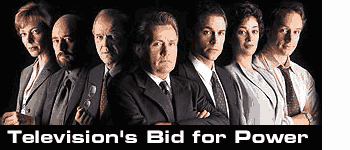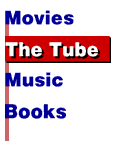
| ||||||
|
| ||||||
| OCTOBER 1999 | FEATURE LAST MONTH |  GREGORY J. ROBB In the past year, I've seen (and heard) more movie actors on television than I can ever remember. It's the result of a shift in the power of media. And from the actor's point of view, the power of television may - in some ways - carry an attraction which equals film. There was a time when people would've trashed actors, artists, for selling out to "the commercial." But my, have they: Jeff Goldblum pitching computers for Apple; Joe Pesci voicing over a Canon commercial. And this fall TV season features so many actors with movie experience that your remote may burn as you try to catch up. This year's early favorite among critics (and it is early) is ABC's "The West Wing." Producers and network executives opened the vaults with the hiring of major movie veterans Rob Lowe and Martin Sheen. Trends in TV ideas are also consolidating. NBC begins "Law and Order: Special Victims Unit" to tap as much of the "ER" fan base as possible. David E. Kelley attempts to bring "Chicago Hope" off the critical list. The west coast version of the same, "L.A. Doctors," enters its second year. And the very creators of "ER" bring similar stories to us in a new show from the paramedical-police point of view on "Third Watch." All examples of how television is trying to cut new pieces into the extremely lucrative medical drama successes which began with one of my favorite shows of all time, "Emergency." Cutting up the ratings pie will be a lot harder on the producers than their veteran actors. The major American networks are putting relatively inexperienced producers into this year's fall TV wars. At ABC, Lloyd Braun is starting his first season as co-head of the ABC Entertainment Group; ditto Garth Ancier at NBC. Doug Herzog at Fox and Suzanne Daniels at the WB are nearly as green, while NBC West Coast president Scott Sassa came onboard a few weeks into last season. Their hair will be on fire in the next few weeks as, surely, some of their shows will be canceled by bad ratings. The difference, though, is critical. The actors can always go back to movie work; the producers? Television series' have an advantage over movies for actors; a predictable schedule. Shows must be shot on time because of the tight deadlines to air. In television production, one can waste money but one simply cannot waste time getting a series shoot into editing. That and, in the case of "West Wing" where the main location is the same, actors get to work in the same place for extended periods. Rob Lowe says that was one of his main reasons for choosing to move into "The West Wing." He says he's working harder than ever. But "...the only thing that makes it tolerable is for the first time, I'll be able to plan my life. I'll know when I can take a vacation. I'll know when the kids can come to the set. I'll know when I can go home." It sounds like lifestyle is as much a factor for Lowe as money. Michael J. Fox decided to return to television sit-coms four years ago with the debut of Spin City - a show which now welcomes Heather Locklear to its cast. Hell, even judges are getting into the act. Judge Judy, Mills Lane (the man who refereed the Tyson-Holyfield ear-biting contest) and Judge Joe Brown are reviving the "real" courtroom drama begun many moons ago by the beloved Judge Joseph Wapner. When legal people walk away from their legal incomes for television, you know something is afoot. The shift in attitudes towards more commercial work reflects radically-swift mergers and acquisitions in the broadcasting industry. Obviously, the CBS-Viacom deal is the biggest of the recent moves and much has been written on that. But consider that even Canadian-based Rogers Communications received a $600 million infusion of capital - a vote of confidence you might say - from Microsoft earlier this summer. Rogers is very quickly changing the face of broadcasting in Canada and was recently mentioned on CNN's Moneyline as a good communications stock investment. All indicators point to a continuation of consolidation which broadcasters say will help to ensure their financial survival. This is not suggest any weakness in the power of film. It's only to suggest that allegiances are being forged across communications-based industries. Look for Hollywood to simply get into the investment business further. The bid for power is opening up on a new level in television this season. And it's drawing the big names, the big money and fewer, larger broadcast conglomerates. A bad thing? The answer is forthcoming.
GREGORY J. ROBB, a high school English teacher, gained communication experience in radio, television and print. He is the staff television writer for Renaissance Online Magazine. | |||||
 | ||||||
| Full Issue Contents | FEEDBACK | Questionnaire | Archive | Free Subscription | ||||||

